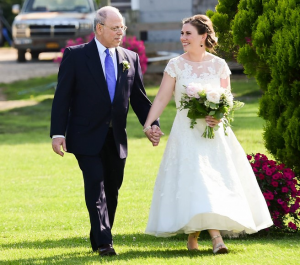You Can Love the Sun…and Protect Yourself From It
Posted on by
By Leslie W. Ross, MPH
Evaluation Fellow
My father had naturally pale skin as the son of two Polish parents. When his family immigrated to the United States, they lived in sun-soaked Puerto Rico for the first 2 years of his life. They then moved to New York, where he spent summers mostly outdoors as a camper and then counselor at a Jewish summer camp. As a teenager, he’d intentionally lay out in the sun to tan his skin because he liked the way it looked. Later on, some of my favorite memories with Dad were visiting my grandma in Florida and bobbing in the waves of the Atlantic Ocean.
Dad loved the sun. Unfortunately, sun-protective behaviors just weren’t the norm when he was growing up—he never even wore sunscreen until later in his adulthood.
On Memorial Day weekend in 2013, I was returning from a trip to the beach with my fiancé when I got the call that my mom had taken Dad to the hospital. He was dizzy, slurring his speech, and having trouble walking. We thought he might have had a stroke, but then the doctors found the cause—a large brain tumor, caused by stage IV metastatic melanoma.
Within a week, he went in for surgery to remove the tumor, but his surgeon couldn’t remove the cancer cells completely—the cancer was too pervasive. Surgery was followed by a grueling regimen of radiation, oral chemotherapy, immunotherapy, steroids, and many other treatments to manage his side effects. For my family, our lives became a blur of going from appointment to appointment, trying to understand Dad’s treatment regimen, helping him manage his side effects, and supporting him during this difficult time.
The months between Dad’s diagnosis and when he passed were one of the most heartbreaking periods of my life. Knowing that my time with him was limited made me appreciate the good days we had. From everything we were told about his diagnosis, we thought we’d only have a few months, but he survived for over a year. For some of that time, he was well enough to go on vacation with my mom and play with his 2-year-old granddaughter. I was incredibly lucky that he was able to be there for my wedding and share a father-daughter dance. About a month later, he lost mobility, and a few months after that, he was gone.
Make Sun Safety a Habit
Ultimately, this is not a story of how to survive or care for someone with metastatic melanoma. While treatment options have improved since my dad was diagnosed, the prognosis is still not good. The message I hope others can take from this is to make sun safety a habit to reduce the chance of getting skin cancer. It’s also important to be aware of changes in your skin, so that if you do develop skin cancer, you can find it early. When skin cancer is caught early, it is more treatable than in its later stages.
As someone with a family history of skin cancer, I take extra precautions to protect myself from the sun. I still love going outdoors; being in the fresh air recharges me. I’ve made a habit of wearing sunscreen with a sun protection factor of at least 30 (50+ in the summer) any time I go outside. I also try to find shade during peak sunlight hours and wear clothing and accessories that provide extra sun protection, like a long-sleeved shirt and sunglasses. You can find more sun safety tips here.
Our communities can help too. Implementing proven strategies, such as providing shade and free sunscreen and scheduling outdoor activities during off-peak sunlight hours, can make it easier for us to avoid getting sunburned and reduce skin cancer risk.
Because skin cancer is common in my family, I’ve also made sure to see my dermatologist annually for a skin exam. I’ve had a few atypical moles removed and biopsied (all were benign). None of us know what the future will bring. But after my dad’s experience, it has given me peace of mind to add skin cancer screening to my health care routine and to know that I’ll be treated early if my dermatologist finds anything precancerous. To me, the minor discomfort of a biopsy is well worth avoiding the later stages of skin cancer. Like many men, my dad avoided going to the doctor for checkups and screenings. I always wonder what would have happened if a doctor had found the melanoma sooner.
May is Skin Cancer Awareness Month, and May 3 is Melanoma Monday. As I remember my dad and his experience with melanoma, it is incredibly meaningful to me that I’m able to contribute—in my own small way—to help communities prevent cancer, find it early, and improve outcomes for cancer survivors. I think my dad would have been proud.
Posted on by

